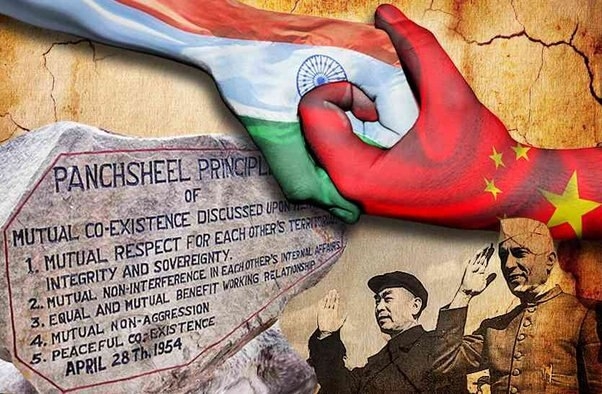India have to exit the Nehruvian failed 'One China Policy'
After the establishment of the Republic in China in 1911, the rule of the army chief continued there. This was followed by a prolonged civil war between nationalist and communist parties in the interior regions of China.

Experts, political analysts and experts on international affairs related to China say that India should now distance itself from the Nehruvian 'One China Policy' and respond to it in its own language.
After the establishment of the Republic in China in 1911, the rule of the army chief continued there. This was followed by a prolonged civil war between nationalist and communist parties in the interior regions of China.
This civil war was won by communist groups under the leadership of Mao Zedong in 1949. The nationalist group then left mainland China and fled to Taiwan. And Taiwan was introduced by the nationalist group as the Republic of China.
At that time, the whole world and the United Nations Committee recognized the then Republic of China i.e. Taiwan as the main China.
The communist group began to call mainland China and other lands it occupied in the region, including Inner Mongolia of Mongolia, the Xinjiang region of Turkmenistan, the region of Manchuria, and the Tibet Autonomous Region, all of which came to be known as mainland China as the People's Republic of China.
At the time when this incident was happening in China, there was a cold war going on in the world between the Soviet Union and the United States. The world was divided into two camps in the name of communism and capitalism.
During this period, Indian Prime Minister Pandit Jawaharlal Nehru superficially claimed to be non-aligned but his closeness to the Soviets was well known.
At a time when the People's Republic of China (present day China) was not being recognized as a nation by other countries of the world, India, under the leadership of Prime Minister Nehru, not only accepted China as a nation but also recognized all the territories occupied by China. The areas taken were also accepted under the One China Policy.
This was no less than a Himalayan blunder for India. During the Cold War, under the leadership of Pandit Nehru, India maintained relations with Beijing but relations with Taipei (the capital of Taiwan) were completely severed.
In 1971, China i.e. People's Republic of China was recognized in the United Nations. Even after this, many countries of the world maintained relations with both the Republic of China (Taiwan) and the People's Republic of China (present-day China) under the Two China Policy.
America announced the end of this Two China policy in 1979. The United States officially severed all ties with Taiwan and linked its political ties to the People's Republic of China.
After this, many countries of the world almost ended relations with Taiwan. As far as India is concerned, India was already pursuing its relations with the People's Republic of China by recognizing all the territories occupied by China under China's One China Policy and relations with Taiwan were almost over. .
After the end of the Cold War, when the Soviet Union disintegrated and a terrible economic situation arose in India, India took steps towards the "Look East" policy in 1991.
Under the policies of this policy, India re-established relations with Taiwan as a normal relationship in 1995. After this, small treaties were signed between India and Taiwan, which strengthened the relationship a bit.
In 2002, an agreement was signed between India and Taiwan on bilateral investment. Flights between Delhi and Taipei were started in 2003. In 2004, former Union Defense Minister George Fernandes participated in the trilateral conference held in Taiwan which included India, Japan and Taiwan. In 2005 and 2006, some Taiwanese delegations visited India and met their counterparts.
In 2006, a private organization called Taiwan India Cooperation Council was formed with the aim of strengthening economic relations between Taiwan and India. In 2007, Ma Ying-jeou, then head of Taiwan's Kua-min-tang party, paid an unofficial visit to India.
Apart from this, till 2012, different activities took place between India and Taiwan. But after Narendra Modi assumed the post of Prime Minister in 2014, experts were hopeful that India could leave the One China policy and take some big steps.
If we look at the activities of the last 6 years and the nefarious activities currently being done by China on the border, it is now clearly visible that India has decided to abandon the One China Policy soon.
Actually, not only Taiwan is under China's One China Policy. Inner Mongolia was also forcibly occupied by China. Apart from this, Tibet is also occupied by China.
China also occupies the Xinjiang region of Turkmenistan, where China keeps more than 10 lakh Muslims like second-class prisoners. China also has control over Manchuria in the north-eastern region. In Hong Kong too, China has started a complete dictatorship by introducing the National Security Act. Apart from this, the Chinese Air Force is continuously infiltrating Taiwan and threatening Taiwan.
China considers all these areas as its own and by combining them it talks about One China.
Just as China has told India in the matter of Ladakh that it does not consider Ladakh as a Union Territory, in the same way India should now say the same thing regarding Tibet, Taiwan, Hong Kong, Xinjiang, Manchuria and that Nehruvian forest. China policy should be completely abolished.


